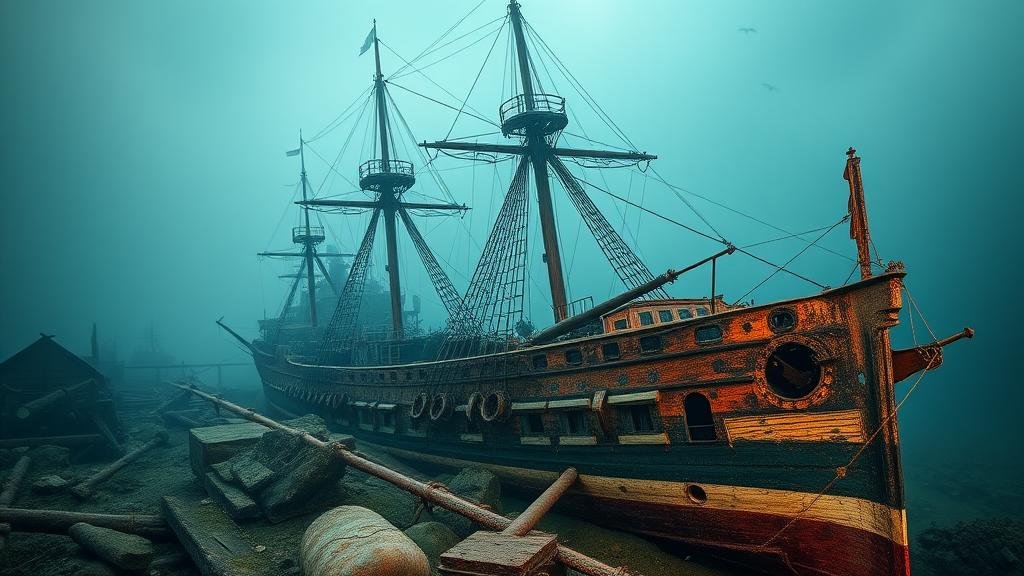Using Naval Archives to Track Down Missing Shipwrecks
Using Naval Archives to Track Down Missing Shipwrecks
The discovery and preservation of sunken shipwrecks are crucial for understanding maritime history. With millions of shipwrecks around the world, many remain undiscovered or forgotten. This article explores how naval archives serve as vital resources in the quest to locate these missing shipwrecks, offering insights into methodologies, case studies, and future implications for maritime archaeology.
The Importance of Naval Archives
Naval archives contain a wealth of information, including logbooks, shipping manifests, and naval records that date back centuries. e documents can provide critical data regarding the last known positions of ships, their cargo, and potential causes of sinking.
For example, the United States National Archives holds vital documents related to naval operations, including records from the U.S. Navys World War II efforts that detail numerous loss events. These records contribute to reconstructing historical maritime events and can indicate potential shipwreck locations.
Research Methodologies
Utilizing naval archives to locate missing shipwrecks involves several research methodologies, including:
- Document Analysis: Researchers examine logs and diaries for records that specify ship routes and sinking events.
- Geographical Information Systems (GIS): GIS technology is employed to visualize and analyze spatial locations mentioned in historical documents.
- Underwater Surveys: Targeted dives and sonar mapping in identified zones are crucial to physically locate shipwrecks.
These methodologies allow researchers not only to identify the potential locations of shipwrecks but also to understand the broader historical context of ship operations and maritime routes.
Case Study: The USS Scorpion
The USS Scorpion was lost at sea in May 1968, and its location remained a mystery until naval archives were scrutinized. A thorough examination of naval records, including patrol logs and maintenance reports, complemented by expert analysis of acoustic data, led to the discovery of the wreckage off the coast of the Azores in 1968.
The archives provided critical insights regarding the last known operations of the Scorpion, contributing not only to finding the wreck but also to ongoing analyses of its mechanical failures. This case underscores the significance of archival records in maritime investigations.
Challenges in Utilizing Naval Archives
Despite their potential, researchers face several challenges when using naval archives:
- Data Gaps: Many records may have been lost or damaged over time, creating incomplete historical narratives.
- Lack of Standardization: Inconsistencies in documentation practices across different naval files can complicate research.
- Access Restrictions: Some documents remain classified or restricted, limiting researchers ability to gather comprehensive data.
Confronting these challenges requires collaboration between maritime historians, archaeologists, and archivists to ensure comprehensive research and recovery efforts.
Future Implications for Maritime Archaeology
The integration of new technologies with traditional naval archive research will enhance the discovery of shipwrecks. Advances in remote sensing technologies such as lidar and high-resolution sonar, when combined with historical data from archives, can significantly improve the accuracy of shipwreck location efforts.
A notable example is the combination of satellite imagery with archival records, which has allowed researchers to locate shipwrecks in areas previously believed to be barren or unpopulated.
Conclusion
Naval archives play an indispensable role in the endeavor to track down missing shipwrecks. By providing historical context, geographic insights, and operational details, these archives enable researchers to develop effective methodologies for shipwreck discovery. Despite existing challenges, future technological advancements combined with historical research present promising avenues for uncovering lost maritime treasures.
For maritime archaeologists, leveraging naval archives not only aids in the physical discovery of shipwrecks but also enriches our understanding of the historical narratives associated with these vessels. As such, collaboration across disciplines and innovations in technology will be the keystones of successful future explorations.
Researchers and enthusiasts alike are encouraged to explore naval archives, as these repositories hold secrets that can illuminate our maritime past, helping to unveil the stories locked within the depths of the worlds oceans.



